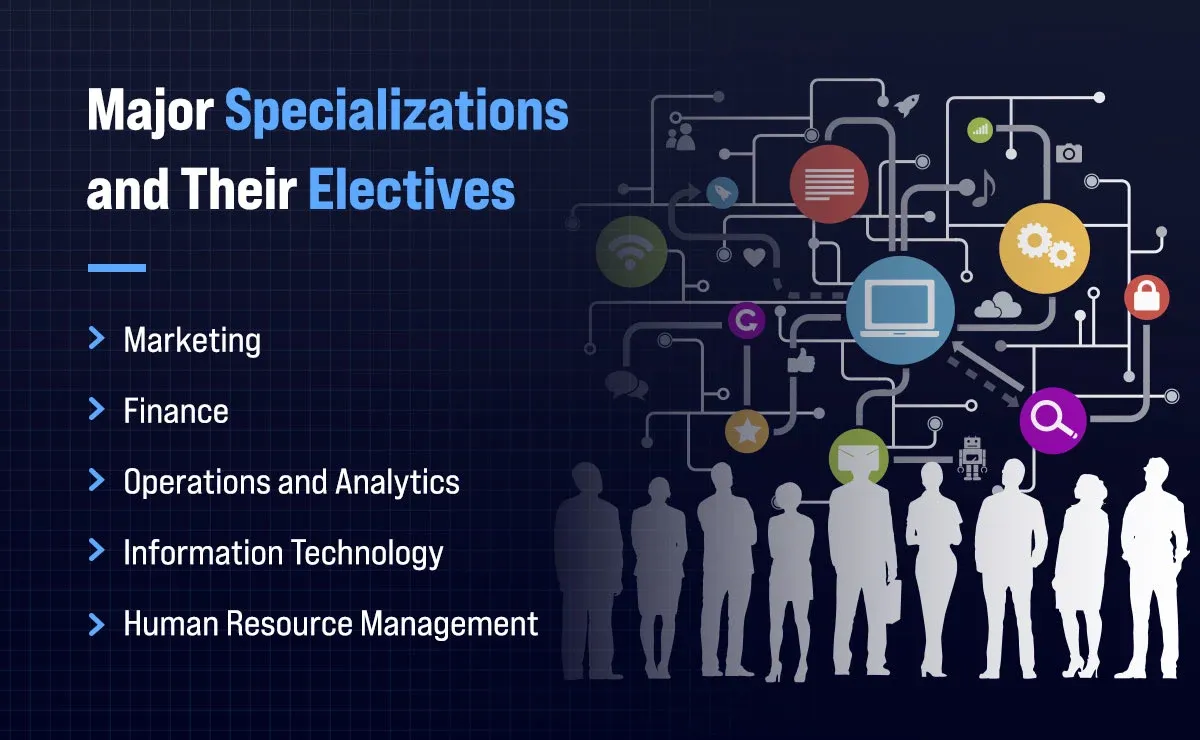Exploring MBA Subjects

The MBA curriculum is a meticulously designed academic pathway that transforms aspiring students into strategic business leaders through a comprehensive blend of foundational knowledge and specialized expertise.
This two-year journey follows a progressive framework where the first year immerses students in essential subjects like financial accounting, marketing management, and quantitative methods, ensuring every graduate possesses versatile cross-functional competencies. The second year then shifts its focus toward elective-driven specialization, allowing students to gain expertise in their chosen field.
Hence, the combination of mandatory core subjects and flexible electives, complemented by an experiential learning pedagogy, ensures MBA graduates emerge as well-rounded professionals capable of navigating complex business challenges.
This article explores how MBA subjects are organized, why each area matters, and how the curriculum builds the competencies future leaders need.
Why does the MBA Syllabus Matters?
An MBA is often described as one of the most desired qualifications for business professionals. It does more than teach fundamental business concepts. A modern MBA syllabus aims to:

- Builds a Strong Foundation: Ensures every student master core subjects in finance, marketing, operations, and human resources before moving on to advanced topics.
- Promotes Integrated Learning: Guides how different disciplines connect, so students learn to apply financial analysis in marketing decisions and use organizational behavior insights in strategy formulation.
- Aligns with Industry Needs: Incorporates emerging trends such as digital transformation, data analytics, and sustainability to keep graduates relevant in a rapidly evolving corporate landscape.
- Facilitates Skill Development: Balances theoretical knowledge with practical skill building through workshops, simulations, and internships that sharpen quantitative, analytical, and communication abilities.
- Enables Specialization: Offers specialization courses that let students tailor their MBA journey to specific career goals in areas like finance, consulting, entrepreneurship, marketing, or supply chain management.
MBA Term‑Wise Subjects in India
MBA programs in India typically span 6 terms divided into 2 years. The first year builds core functional expertise through mandatory courses, and the second year empowers students to specialize in domains of their choice. However, please note that specific course titles and subjects may vary from one institute to another. The following represents a typical term-wise outline of subjects you will encounter in tier 1 and 2 MBA programs in India.
First Year (Terms 1–3)
All students complete the same core modules across Terms 1–3, each blending conceptual frameworks with real-world applications.
Term 1
1) Quantitative Methods
Students are introduced to probability theory, descriptive statistics, hypothesis testing, and regression models. Practical sessions in spreadsheet modeling translate raw data into actionable insights, anchoring data-driven decisions in marketing, operations, and finance.
2) Managerial Economics
Using microeconomic frameworks, this course delves into demand-supply dynamics, production theory, cost analysis, and pricing techniques. Economic frameworks help students make informed choices about resource allocation, pricing policies, and market entry.
3) Financial Accounting
As the language of business, accounting enables students to record transactions, prepare financial statements, and interpret balance sheets, income statements, and cash flow reports. Financial ratio analysis evaluates profitability, liquidity, and solvency, aiding in informed strategic planning.
4) Marketing Management
Fundamental marketing concepts such as market segmentation, targeting, positioning, and the marketing mix are explored. Students learn to analyze consumer needs, craft value propositions, and design promotional campaigns.
5) Human Resource Management
This module covers recruitment, training, performance appraisal, and compensation design. By aligning people's strategies with organizational goals, students gain the skills to attract, retain, and motivate talent.
6) Business Communication
Effective written and oral communication is essential for managers. Through case presentations, report writing, and interactive workshops, students hone clarity, persuasion, and professional etiquette.
7) Information Technology Management
This course examines how technology supports business processes. Topics include enterprise resource planning systems, digital transformation trends, and data security fundamentals.
Term 2
1) Operations Management
Focused on the production and delivery of goods and services, students learn capacity planning, facility layout, demand forecasting, inventory control, and quality management. Concepts such as lean operations and supply-chain coordination prepare them to optimize processes and reduce waste.
2) Financial Management
Building on accounting, this subject covers capital budgeting, cost-of-capital estimation, working-capital decisions, capital-structure theories, and dividend policy. Case exercises sharpen skills in evaluating investment projects and balancing risk–return trade-offs.
3) Organizational Behavior
A continuation of first-year HRM, this course explores individual and team dynamics within firms, using cases and simulations to develop skills in motivation, leadership, culture diagnosis, change management, and building collaborative, high-performance workplaces.
4) Cost and Management Accounting
Emphasizing internal decision support, learners study costing approaches, variance analysis, activity-based costing, and budgets, using cost information to guide pricing, product-mix, and operational decisions.
5) Marketing Research
Here students explore market research methodologies, including research design, sampling techniques, questionnaire construction, data collection, and statistical analysis using software tools. By the end, you can translate raw data into consumer insights and evidence-based marketing strategies.
6) Management Information Systems
This course demonstrates how information systems facilitate business operations and enhance decision-making. You study system development life cycle, enterprise resource planning, customer relationship management, data security, and emerging technologies such as cloud computing and business intelligence.
7) Business Research Methods
This subject provides methodologies for conducting detailed research, covering qualitative and quantitative designs, hypothesis validation, regression studies, and report preparation. These skills are essential for your summer project and any data-driven decision-making in future roles.
Term 3 and Summer Internship
1) Business Research Methods
Students Delve into designing rigorous business research studies, formulating hypotheses, selecting appropriate sampling techniques, and applying both qualitative and quantitative methods.
2) Business, Environment & Sustainability
Examine how firms integrate sustainable practices into their strategy, from lifecycle assessments and circular‐economy models to balancing profitability with social and ecological responsibility.
3) Strategic Analysis
Core strategy tools such as Porter's Five Forces, value chain mapping, and SWOT analysis equip students to evaluate competitive environments and formulate winning strategies.
4) Corporate Finance
Builds on financial reporting foundations to evaluate investment opportunities using discounted cash‐flow analysis and value‐maximization frameworks.
5) Legal Environment of Business
It provides a conceptual understanding of contract law, corporate regulations, intellectual property rights, and compliance mechanisms that govern corporate conduct.
6) Summer Internship
After Terms 3 and before the beginning of the second year, students undertake a summer internship with corporate partners, gaining hands-on experience that validates concepts and builds market insight.
Second Year (Terms 4–6)
At the beginning of the second year, students are given the opportunity to choose an area of specialization and select a number of elective subjects tailored to their functional and interdisciplinary needs.
Term 4 & 5
- Students dive into advanced core electives in their chosen specialization, often with projects or field-based learning.
- Exchange programs at partner schools.
- Intensive field courses in sectors like agriculture, public policy, or digital innovation.
Term 6
The final term is designed to integrate knowledge through capstone projects and advanced electives:
1) Capstone Simulation
Students participate in a cross-functional business simulation where they run virtual firms, making integrated decisions across finance, marketing, operations, and HR.
2) Advanced Strategic Management
Building on strategic analysis, this course covers corporate-level strategy topics such as diversification, mergers and acquisitions, and business model innovation.
3) International Business Environment
Students explore global trade policies, foreign exchange risk management, and strategies for international market entry and expansion.
4) Electives
The remaining electives give students flexibility to deepen their expertise in their chosen domain.
Major Specializations and Their Electives

Elective and core subjects differ in structure, with MBA electives selected based on individual specializations, career aspirations and interests. These carefully curated electives are designed to deepen functional expertise while fostering interdisciplinary knowledge and refining essential leadership and digital competencies.
Specializations | Elective Subject Titles |
Marketing | Brand Management, Market Research and Analytics, Consumer Behaviors, Digital Marketing, B2B Marketing and Pricing, Sales and Distribution Management, etc. |
Finance | Corporate Finance, Investment Analysis and Portfolio Management, Private Equity and Venture Capital, Derivatives and Risk Management, Financial Modeling, Private Equity and Venture Capital, etc. |
Operations and Analytics | Supply Chain Management, Project Management, Predictive Analytics, Business Forecasting, Inventory Optimization, Quality Management Systems, etc. |
Information Technology | Management Information Systems (MIS), Business Analytics, Big Data Analytics, Information Technology Management, Product Management, eCommerce and Digital Business, Enterprise Resource Planning (ERP), Cloud Computing, etc. |
Human Resource Management | Human Resource Management, Talent Management, Organizational Development and Change, Compensation and Benefits, Training and Development, Performance Management, Diversity and Inclusion Management, etc. |
FAQ
Q1. Is an MBA full of math?
Ans: While an MBA includes quantitative courses such as statistics, operations research, and financial analysis, the emphasis is on applied math to support decision-making rather than advanced theoretical mathematics.
Summing Up
The MBA curriculum's true strength lies not in individual subjects but in their strategic interconnection, where financial analysis informs marketing decisions, organizational behavior shapes operational efficiency, and quantitative methods drive strategic insights. This holistic framework ensures graduates think beyond functional silos and view each term as building blocks toward comprehensive business leadership.
Ultimately, the MBA journey transforms the strategic vision of their students while preparing them to navigate uncertainty, lead cross-functional teams, and drive sustainable business growth in an increasingly complex global marketplace.





